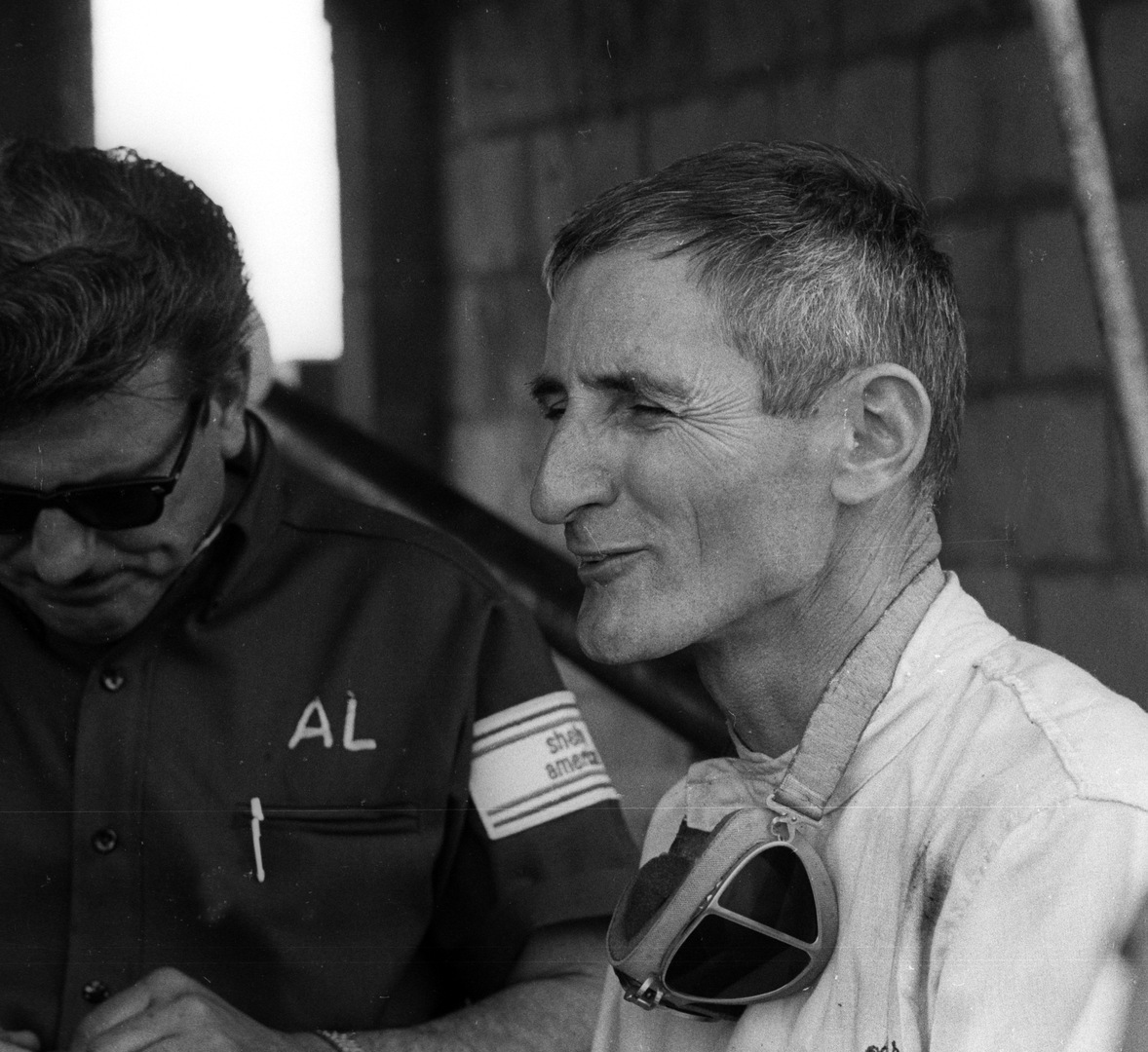Ken Miles: The Unsung Racing Hero Who Defied Expectations
Table of Contents
- Ken Miles: A Motorsport Icon's Biography
- The Engineering Mind: Beyond the Driver's Seat
- The Shelby-Miles Partnership: Forging Legends
- The 1966 Le Mans: Triumph, Controversy, and a Stolen Victory
- The Tragic End: Ken Miles's Legacy and Death
- "Ford v Ferrari": Bringing Ken Miles's Story to the Big Screen
- The Enduring Legacy of Ken Miles
- Preserving the Legend: The Ford GT40 Today
Ken Miles: A Motorsport Icon's Biography
To truly appreciate the impact of Ken Miles, one must first understand the man behind the wheel. Kenneth Henry Jarvis Miles was born on November 1, 1918, in Sutton Coldfield, then part of Warwickshire, near Birmingham, England. His early life was marked by a clear inclination towards mechanics and a burgeoning passion for speed, laying the groundwork for a career that would defy conventional expectations.Early Life and Mechanical Roots
Ken Miles's journey into the world of automobiles began at a young age. The son of Eric Miles and Clarice Jarvis, he left school at the age of 15, a decision driven by his ambition and a failed attempt to run away to the United States. He secured an apprenticeship at Wolseley Motors, a pivotal experience that further broadened his knowledge of vehicle construction. This hands-on training was invaluable, transforming his natural aptitude into a formidable skill set that would serve him throughout his career, both as a mechanic and a driver. Before the outbreak of World War II, Miles honed his racing skills on motorcycles. When the war began, he served as a tank sergeant in the British Army, an experience that undoubtedly instilled in him discipline, resilience, and a profound understanding of mechanical systems under pressure. After the war, his passion for racing reignited, leading him to compete with vintage sports cars like Bugattis, Alfa Romeos, and Alvises, showcasing his versatility and deep appreciation for automotive engineering. **Personal Data: Ken Miles** | Attribute | Detail | | :------------------ | :---------------------------------------------------------------------- | | **Full Name** | Kenneth Henry Jarvis Miles | | **Born** | November 1, 1918 | | **Birthplace** | Sutton Coldfield, Warwickshire, England (now Birmingham) | | **Parents** | Eric Miles and Clarice Jarvis | | **Nationality** | British | | **Occupation** | Racing Engineer, Professional Racing Driver | | **Notable Teams** | Shelby American | | **Inducted Into** | Motorsports Hall of Fame of America (2001) | | **Died** | August 16, 1966 | | **Death Place** | Riverside International Raceway, California, USA | | **Cause of Death** | Testing accident | | **Portrayed By** | Christian Bale in "Ford v Ferrari" (2019) | | **Son** | Peter Miles |The Journey to American Motorsport
Ken Miles eventually made his way to the United States, where his career truly took off. He became a prominent figure in American motorsport, known for his unique blend of engineering insight and aggressive driving style. He raced a variety of vehicles, including his own designed and built cars, as well as Porsches and MGs. However, it was his association with Carroll Shelby and the Shelby American team that catapulted his fame to new heights. His prowess wasn't limited to specific tracks; Miles set speed records at Bonneville, competed in the high-octane Nassau Speed Weeks races, and, most famously, at Le Mans. His ability to push cars to their absolute limits, coupled with his deep understanding of their mechanics, made him an invaluable asset to any team he joined. In 2001, in recognition of his significant contributions and achievements, Ken Miles was posthumously inducted into the prestigious Motorsports Hall of Fame of America, cementing his place among the sport's all-time greats.The Engineering Mind: Beyond the Driver's Seat
What set Ken Miles apart from many of his contemporaries was not just his exceptional skill behind the wheel, but his profound understanding of automotive engineering. He wasn't merely a driver; he was an automotive engineer who played a crucial role in developing some of the most iconic racing machines in history. His expertise extended to designing and building cars, a testament to his comprehensive knowledge of vehicle construction and performance. Miles was instrumental in the development of legendary vehicles such as the Shelby Cobra 289 and, most notably, the Ford GT40. His hands-on approach meant he could articulate exactly what a car needed to perform better, bridging the gap between the engineers in the workshop and the demands of the racetrack. This unique duality – being both a skilled mechanic and a successful racer – allowed him to provide invaluable feedback, pushing the limits of vehicle design and contributing directly to the advancements that defined an era of motorsport innovation. His insights were critical in transforming promising prototypes into championship-winning machines.The Shelby-Miles Partnership: Forging Legends
The collaboration between Ken Miles and Carroll Shelby is one of the most celebrated partnerships in motorsport history. It was a dynamic alliance built on mutual respect, shared ambition, and an unwavering commitment to beating the best. Carroll Shelby, a visionary automotive designer and former racer, recognized Ken Miles's unparalleled talent and enlisted him to drive the Ford GT40 Mk1. This partnership was central to Ford's audacious bid to challenge Ferrari's dominance at the 24 Hours of Le Mans. Throughout their work together, Ken Miles and Carroll Shelby constantly pushed the limits of vehicle performance. Their relationship, as depicted in "Ford v Ferrari," was a blend of clashing egos and shared passion, a testament to two talented individuals struggling to balance creative integrity with the commercial viability demanded by Ford. Miles's relentless pursuit of perfection often led him to have a few serious accidents during testing, highlighting the extreme risks he took in the quest for speed and reliability. Yet, these incidents only underscored his dedication and fearlessness. The Shelby-Miles partnership was not just about building fast cars; it was about forging a legacy, a testament to what could be achieved when genius engineering met fearless driving.The 1966 Le Mans: Triumph, Controversy, and a Stolen Victory
The 1966 24 Hours of Le Mans race stands as a monumental chapter in motorsport history, and Ken Miles was at its very heart. It was the culmination of years of effort, massive investment by Ford, and the relentless work of individuals like Miles and Shelby, all aimed at dethroning the perennial champion, Ferrari.The Race That Defined an Era
The film "Ford v Ferrari," directed by James Mangold, vividly portrays Ford's triumph over Ferrari at this iconic race. It was a tale of corporate ambition meeting raw racing grit. Ken Miles, driving the Ford GT40, was a key player in this historic event. He was an integral part of the team that aimed to break Ferrari's long-standing winning streak. His skill, combined with the power and reliability of the Ford GT40, positioned him for what should have been an undeniable victory. Miles, along with his co-driver Denny Hulme, demonstrated exceptional performance throughout the grueling 24-hour race. They maintained a commanding lead, showcasing not only the speed but also the remarkable reliability of the GT40 that Ken Miles had helped design and develop. Their performance was a clear indication that Ford had finally built a machine capable of competing, and winning, against the best in the world.The Unjust Finish
Despite his undeniable lead and superior performance, Ken Miles was, in the eyes of many, robbed of a clear victory at the 1966 Le Mans. The decision by Ford management to orchestrate a staged finish – where all three leading Ford GT40s would cross the finish line together for a photo opportunity – led to a controversial outcome. Due to a technicality regarding the starting positions and distance covered, Bruce McLaren and Chris Amon, starting further back, were declared the winners, having technically traveled a greater distance in the same time. This decision was a heartbreaking moment, not just for Ken Miles but for many who witnessed his incredible drive. He had won on reliability and speed, but the corporate directive overshadowed his individual achievement. The incident underscored the tension between the pure pursuit of sporting victory and the commercial and marketing considerations of a major corporation. While the overall triumph for Ford was undeniable, Ken Miles's personal victory was unjustly taken, a poignant detail that adds to the tragic narrative surrounding his life.The Tragic End: Ken Miles's Legacy and Death
The story of Ken Miles is inextricably linked to his untimely and tragic death, which occurred just two months after the 1966 Le Mans race. It was a devastating loss for the motorsport community and a stark reminder of the inherent dangers of pushing the boundaries of automotive performance.The Riverside Accident
Ken Miles died on August 16, 1966, in a testing accident at Riverside International Raceway in California. He was testing Ford's experimental J-car, a prototype that was intended to be the successor to the GT40. The car, which later evolved into the GT40 Mk IV, suffered a catastrophic mechanical failure – specifically, a suspension collapse – at high speed, leading to a fatal crash. His death was a profound shock. It highlighted the immense risks that test drivers and engineers undertake in developing these cutting-edge machines. Miles, known for his meticulous attention to detail and his ability to push cars to their absolute limit, was doing what he did best: refining and improving a vehicle for future competition. The accident underscored the fine line between innovation and peril in the world of high-speed racing. While "Ford v Ferrari" portrays his death as a heartbreaking moment, it also changes several details of the true story for dramatic effect, though the core tragedy remains accurate. The film correctly depicts that he died shortly after the 1966 Le Mans, specifically two months later."Ford v Ferrari": Bringing Ken Miles's Story to the Big Screen
The 2019 film "Ford v Ferrari" brought the incredible story of Ford's challenge to Ferrari's dominance at Le Mans to a global audience, with Ken Miles at its emotional core. Directed by James Mangold, the movie effectively captured the intensity of the racing world, the corporate battles, and the personal sacrifices involved. Christian Bale's portrayal of Ken Miles was widely acclaimed, capturing the British driver's eccentricities, his fierce dedication, and his undeniable talent. The film highlighted his crucial role in developing the Ford GT40 Mk1 alongside his best friend, Carroll Shelby, portrayed by Matt Damon. It showed their relentless pursuit of speed and reliability, leading to Ken having a few serious accidents during testing, illustrating the immense pressure and danger they faced. While the movie takes some artistic liberties for narrative impact – for instance, the exact details surrounding Ken Miles's death in "Ford v Ferrari" are not far from what really happened, although the film changes some specifics to enhance the storytelling – it largely succeeds in conveying the significance and legacy that Ken Miles left in motorsport. For years, Hollywood had wanted to adapt the true story of Ford's triumph over the perennial champion Ferrari at the 1966 24 Hours of Le Mans race, and for good reason. The film finally delivered this compelling narrative, shining a much-deserved spotlight on an unsung motorsports hero. Ken Miles is depicted as one of the best, a testament to his enduring impact. It's worth noting that Ken Miles's son, Peter Miles, played a crucial role in the film's production. Despite not pursuing a racing career like his father, Peter contributed to "Ford v Ferrari" to ensure the accurate portrayal of his family's story, adding a layer of authenticity to the emotional narrative.The Enduring Legacy of Ken Miles
Even decades after his passing, the legacy of Ken Miles continues to resonate deeply within the motorsport community. He is remembered not just as a fearless driver but as a visionary engineer whose contributions were pivotal in shaping the landscape of high-performance racing. His induction into the Motorsports Hall of Fame of America is a testament to his lasting impact and the respect he commands among his peers and subsequent generations. Ken Miles's story is a powerful reminder of the human element in racing – the courage, the intellect, and the sheer will required to push boundaries. He embodied the spirit of innovation and relentless pursuit of excellence. His name is an important one in Ford motorsport history, forever linked with the iconic GT40 and its historic victory at Le Mans. He exemplified the dedication required to transform a corporate mandate into a sporting triumph. His journey also serves as a poignant illustration of the fine line between ambition and tragedy in a sport where one false step could have catastrophic consequences. The fact that his win at Le Mans was "stolen" from him only adds to the legendary status of Ken Miles, cementing his image as a hero who faced both formidable opponents on the track and complex corporate politics off it. His influence extends beyond wins and losses; it lies in the very development of the cars that defined an era.Preserving the Legend: The Ford GT40 Today
The Ford GT40, the car that Ken Miles helped design, develop, and famously drove at Le Mans, remains one of the most iconic racing cars in history. Its legacy is inextricably linked to Miles and the historic 1966 victory. For many enthusiasts, the question often arises: where is the car now, and how is it preserved? Several of the original Ford GT40s, including those that competed in the 1966 Le Mans, are meticulously preserved and housed in various private collections and museums around the world. These vehicles are not merely static displays; they are living pieces of history, often maintained in running condition. Some are even raced in vintage motorsport events, allowing new generations to witness the power and engineering marvel of these machines firsthand. The care taken to preserve these cars underscores their immense historical value and the significant role they played in shaping motorsport. The preservation efforts ensure that the story of the Ford GT40, and by extension, the legacy of Ken Miles, continues to inspire. These cars are a tangible link to a bygone era of racing, a period defined by raw power, mechanical ingenuity, and the fearless individuals who dared to tame them. They stand as monuments to the triumph of American engineering over European dominance, a victory in which Ken Miles played an absolutely indispensable role.Now that you’ve read about racing legend Ken Miles and the true story behind "Ford v Ferrari", consider delving deeper into the life of Carroll Shelby, who worked tirelessly with Miles to build the Ford GT40 and the Shelby Cobra. Their combined genius laid the groundwork for Ford's monumental success and forever changed the landscape of American motorsport. Alternatively, explore the stories of other racing pioneers and their enduring contributions to the sport. Your comments and insights are always welcome – share your thoughts on Ken Miles's incredible journey and legacy below!

Ken Miles races, wins and teams | Motorsport Database - Motor Sport

Ken Miles

Photo :: Ford v. Ferrari' True Story - How Did the Real Ken... | Ken